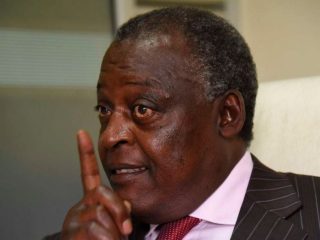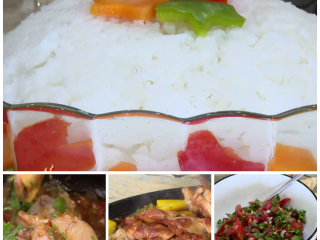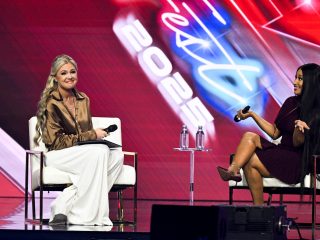
How Arid and Semi-Arid Lands Can Harness Tech Winds To Hasten Development | #EdTech
“The Boy Who Harnessed The Wind” is a Netflix movie based on the true story of 13-year-old William Kamkwamba, and how he harnessed technology to devise an ingenious solution to save his Malawian village from famine.
Despite his deep passion for school, William was thrown out of school because his family could not afford the fees. Undeterred, he sneaked into the library and learned how to build a windmill to save his village.
As fate would have it, William saw a teacher, Tom, using a laptop. Sensing William’s delight and curiosity at seeing his laptop, Tom asked: ‘William, have you ever seen the internet?”
“No.”
In a quiet conference room, Tom sat William down at his computer and explained the trackpad, how the motion of his fingers guided the arrow on the screen.
“This is Google,” Tom said. “You can find answers to anything. What do you want to search for?”
“Windmill.”
Technology is a force for good. It can be harnessed to light up homes and classrooms in remote locations to, among other benefits, drive out ignorance and steer development programs.
Harnessing edtech for socio-economic good is a central objective of EdTech East Africa. And that’s not all. EdTech East Africa is a regional hub that brings together different players and harnesses their capabilities to drive positive change in the edtech space. EdTech Mondays is a monthly telecast, supported by the Mastercard Foundation and EdTech East Africa, that brings together different stakeholders in the EdTech space to share lessons that relate to technology-enabled education. .
In July’s EdTech Mondays conversation, the panelists explored opportunities to improve equity and inclusion in education for learners in the Arid and Semi-Arid Lands (ASALs), with a focus on North and North-eastern (N/NE) counties. 29 counties in Kenya are part of the ASALs which occupy over 80% of Kenya’s landmass, and are home to roughly 36% of the population, 70% of the national livestock herds, and 90% of wildlife.
The panelists were Benta Otsyeno, Training Coordinator, Impact(Ed) International; Virginia Ngindiru, Director of Programs, Zizi Afrique Foundation; and Noel Cheboryot, Senior ICT Officer, National Council for Nomadic Education in Kenya (NACONEK)
Impact(Ed) has opened new doors to education for over 2.6 million students in 16 countries. On the other hand, Zizi Afrique’s work focuses largely on competency acquisition – both reading and math – and competencies required by young people to thrive in the workplace. Meanwhile, NACONEK’s purpose is to primarily bridge the education disparities, characteristic of the ASAL area and urban informal settlements of Kenya.
Learning outcomes
Program moderator, Moses Kemibaro started the conversation by echoing the grim prospects painted by a June 2022 World Bank brief, which stated that the expected schooling in ASALs are as low as 6.5 years compared to most counties in Kenya that exceed 12 expected years of school.
Some of the key factors behind this include the harsh climate, lacking physical and digital infrastructure, cultural values and practices, language barriers as well as the literacy levels of parents and caregivers.
On the issue of learning outcomes, Benta – whose organisation works with schools in Wajir and Kajiado – said that, based on their findings done in 2022, there are approximately 150,000 learners who are still outside school.
“About 79,000 of these are girls,” Benta explained. “A lot of effort is being done by the government and NGOs to bridge this gap.”
Numbers don’t lie. According to the Uwezo 7th Learning Assessment Report, seven counties with the highest percentage of children out of school are all from the Arid and Semi-arid Lands (ASALs) areas.
Practical strategies
“Our focus is learning for all children,” Virginia stated. “We need to ask ourselves what practical strategies we need to deploy in these regions, without just looking at it from the viewpoint of special needs. Because sometimes when you talk about equity and inclusion, the bias is towards SNE.”
Kenya Vision 2030 has answers to Virginia’s concern, which is in the form of a broad range of strategies to enhance participation in ASALs. The first strategy is the establishment and operationalisation of NACONEK in order to promote access, retention and quality education for nomadic communities.
The second strategy is to recruit more teachers for schools in arid and pastoral counties so as to reach the desirable ratio at primary level of 1 teacher to every 25 learners, and at secondary level of 1 teacher to every 40 learners. The other strategies are to construct/rehabilitate 140 low-cost boarding schools in arid and pastoral counties, construct 15 feeder schools in each of 14 arid and pastoral counties, and equip 600 low-cost boarding schools in 14 arid and pastoral counties.
Noel noted that there is a need for strategies to address challenges – brought by free primary education – such as overstrained facilities which cannot cope with the number of learners. Which begs the question: Is free education really free?
As Frederick Ogola notes in a research paper published in the Organization of Social Science Research in Easter and Southern Africa (OSSREA), “it goes without saying that the phrase ‘free education’ would also have varying and at times contradicting meaning and practices.”
“When we train teachers to apply technology in classrooms, the goal is to make learning fun,” Benta explained. “When learning is fun, children will want to come to school. We aim to retain the learners in school and also support transit to higher levels.”
Impact(Ed) tackles the issue of retention by providing content that is suitable for the different learners that can be used as a teaching aid. They go a step further by having animations in the videos, aimed at learners who cannot understand the language of instruction.
However, retention and transition are formidable foes, which need multifaceted interventions. In Influence of Socio-Cultural Factors on Student Transition and Retention in Schools in Msambweni Sub-County, Douglas Wanjala concluded that there is a positive association between socio-economic factors and resident’s attributes, and students’ retention and transition.
Harsh climate
Adan Kassim Farah is the Chief Principal of Wajir High School. He’s in the frontline in education in the ASALs and has witnessed all the harsh realities they have to contend with.
“Security is another aspect,” Adan explained. “Teachers use security as a reason to leave North Eastern. Some teachers left several years ago because they heard a teacher was killed somewhere. And one morning you see 20 teachers leaving, and you’re only left with a few locals.”
That’s a bitter pill to swallow, especially for players who are passionate about equitable education. TSC CEO Nancy Macharia recently said the Commission advertised 36,000 vacancies in December 2022 and recruited 35,790. However, 174, 29 and seven vacancies for intern teachers have not been filled in Mandera, Wajir and Garissa counties, respectively, because no applications were submitted.
One of the strategies of Kenya Vision 2030 is to designate and upgrade three TTCs as centres for Nomadic Education in order to provide teachers in nomadic communities with tailor-made professional support. If this is done, it can stem the high turnover in ASALs and, hopefully, turn it into a national oasis of teachers.
Solutions
“We must first address the poverty issues because there are places that are so poor that children first have to fend for themselves before going to school,” Noel said.
Grace Auma carried out a study titled,The Role of School Feeding Programme in Increasing Performance and Retention Levels in ASAL Areas: A Case Study of Kajiado County (2014-2019).
The study determined that increased performance and retention levels of pupils in ASALs will not be facilitated by the feeding programme alone, but also an increase in human resource, learning materials and improved infrastructure. The majority of responses emphasised the increased participation of county government in the feeding programme to ensure sustainability.
When Impact(Ed) started their program in Wajir, they had content in English and Swahili. But, like they say; different strokes for different folks. Impact(Ed) had to translate their content in Somali so the learners could listen to the content in their first language.
Language can be a barrier or a bridge. One of the conclusions derived from The impact of language policy and practice on children’s learning was that “pro-mother tongue language policy, even when well implemented, cannot by itself turn poor learning environments into good ones. Improved learning outcomes come about when pro-mother tongue language policy, well implemented, accompanies a range of other educational and development initiatives”.
Lone rangers cannot thrive in the edtech space, especially in the ASALs. Partnership is the way to go. Toward this end, NACONEK has partnered with content creators, who teach during a specified time of the day. The children are responding well to this partnership, and technology uptake is growing although there are places that are completely off-grid.
When Zizi Afrique deployed solar-powered radios, they were faced with a unique challenge; there are still the most marginalised within the most marginalised. Which means there are myriad tiers of inequity, which call for myriad tiers of creative solutions.
Digital Equity
Digital Equity is a condition in which all individuals and communities have the capacity and resources needed for full participation in a 21st-century education, economy, and society. Without digital equity, the digital divide will continue getting wider at 5G speeds.
“It’s not a luxury. This is serious. It’s really a social justice issue. It’s a 21st century civil rights issue,” said Cheptoo Kositany-Buckner, the deputy director of strategic initiatives at the Kansas City Public Library and advocate for closing the digital divide.
Digital equity can be curtailed by some of the challenges Impact(Ed) faced when they were doing assessments in Kajiado and Wajir. These ranged from lack of electricity, to instances where some gadgets, like projectors, were not working because they had not been serviced by the relevant authorities. Add to that complex equation lack of teachers, lack of computer libraries, apathy from the community – just to name a few – and stakeholders have their homework cut out for them.
Virginia is of the opinion that stakeholders need to promote the issue of equity in all dimensions, even in issues concerning Off-grid Infrastructures of Inclusion so that off-grid areas can also have radio masts and towers.
Virginia’s right. Equity in all dimensions can be the enabler for invention of home-grown solutions – like William’s windmill – which can rescue communities from the clutches of poverty and underdevelopment.
Guess what? The Policy Framework for Nomadic Education in Kenya may just have taken a leaf from William’s playbook: “Explore the possibility of harnessing the plenty and readily available solar and wind energy resources in the nomadic regions to facilitate e-learning” and, I dare add, development.
Shows
See AllAM Live
AM Live is NTV's morning current affairs show that sets the agenda for the day with insightful panels every weekday.
Business Redefined
Business Redefined is Kenya’s premier thought leadership platform for unpacking matters regarding economic and finance policy as well demystifying complex developments in the region’s capital markets.
Comedies
A collection of our premium content. Diam curabitur vehicula A collection of our premium content. Diam curabitur vehicula
Creatives & Coins Podcast
A podcast that dives deep into the vibrant and rapidly evolving digital creative economy in Kenya. This show explores the lives, challenges, and triumphs of individuals who are successfully navigating the gig and creative economies. From digital artists and content creators to freelance writers and tech entrepreneurs, we spotlight the voices that are shaping the future of work in Kenya.
Documentaries
A collection of our premium content. Diam curabitur vehicula A collection of our premium content. Diam curabitur vehicula
Entertainment
A collection of our premium content. Diam curabitur vehicula A collection of our premium content. Diam curabitur vehicula
Fixing The Nation
Fixing the Nation is a bold and groundbreaking show that will take an unflinching look at challenges facing the Kenyan society and the solutions that can move us forward. It is anchored by respected journalists Eric Lattif, Janet Mbugua, and Mariam Bishar. Podcast created by: Nation FM
Fixing the Nation
Fixing the Nation is a bold and groundbreaking show that will take an unflinching look at challenges facing the Kenyan society and the solutions that can move us forward. It is anchored by respected journalists Eric Lattif, Janet Mbugua, and Mariam Bishar
Full Episodes
A collection of our premium content. Diam curabitur vehicula A collection of our premium content. Diam curabitur vehicula
Gumzo La Sato
Gumzo La Sato is a live social issues show that aims to create awareness about issues affecting the larger society. The discussions range from Parenting, Marital bliss and struggles, Oppression, violence, and all matters of the Heart.
Health Diary
Health Diary is a weekly show that highlights different types of diseases/conditions and seeks ways to prevent, treat/manage them. The show debunks this through real life stories and also feature specialists in different fields, to offer medical advice on the same.
Letter To My Younger Self
Letter To My Younger Self is a podcast where guests get to write a letter to their younger self, from which Maxine formulates questions to ask them during the hour-long show.
Nation Reports
Nation Reports is a weekly podcast offers an opportunity for listeners to interact with various reporters and journey with them as they unravel the biggest most emotive stories.
One Health Lens Podcast
Discussing health matters and human stories from Kenya and across Africa. We talk big picture from people to policy, ecosystems, and everything in between. Follow us on LinkedIn: https://www.linkedin.com/company/onehealthlens
Paradise Lost
Paradise Lost peeks through the story of Louis Otieno, the times, and everything in between.
Primetime
A collection of our premium content. Diam curabitur vehicula A collection of our premium content. Diam curabitur vehicula
Speaking of GEN Z
Speaking of Gen Z brings you entertaining but meaningful conversations about a generation that is trying to navigate through adulthood. Join hosts Michelle, Jackie and Esther as they unravel all things Gen Z.
Sport On
Sport-On is a 30-minute sports magazine show on NTV and 3 hours on NATION FM. The show seeks to give the sports “fanatics” and “funatics” comprehensive and in-depth coverage of sports both locally and internationally.
Tech-over
The extent of technological growth is beyond mere acknowledgment; it has seamlessly integrated into our daily existence. A few years ago, the notion of paying electricity bills through mobile money or recharging with 'tokens' in Kenya seemed inconceivable. Online product sales were considered distant, and artificial intelligence is rapidly reshaping various facets of our lives. Amidst these technological leaps, those with a solid understanding of tech can navigate challenges, seize opportunities, and build a sustainable livelihood. Tech over Show aims to be the platform facilitating discussions among thought leaders, innovators, tech companies, and the government, addressing challenges and opportunities in Kenya's thriving tech industry.
Thamani
Thamani is a business show which is dedicated to emerging issues regarding micro, small and medium size businesses.
The Politalk podcast
This is The Politalk podcast. Here we look into the ins and outs of everything Kenyan politics. We pull no punches and have no reason to sugarcoat anything that matters to Kenyans.
The Trend
A two-hour-long live show that airs on Fridays. The show focuses on what is current in the entertainment industry, controversial and popular across all media platforms targeting those aged between 25 and 35 years.
The trend podcast
The trend podcast highlights and captures the best of banter from #TTTT segment that airs every Friday on NTV. It's the TTTT EXTRA
The Wicked Edition
The Wicked Edition with Dr. King’ori seeks to address serious issues through humour and relatable wit. It is a two-part half hour show filmed in front of a live audience
Trending
A collection of our premium content. Diam curabitur vehicula A collection of our premium content. Diam curabitur vehicula
Twende
Twende is a travel show that highlights beautiful, unique, diverse locations, people, and cultures. The show offers fresh perspectives on familiar locations and memorable experiences in new ones.
Unscripted
This Saturday evening lifestyle show lets viewers share their stories and life experiences as openly & honestly for the purpose of shifting the culture of silence.
VIP Access
VIP ACCESS is Anyiko Owoko’s YouTube and podcast show on Music and Culture dedicated to promoting Africa’s most promising talent and creatives. This podcast grants you VIP access into timeless interviews while providing a platform for rising as well as established artists across the continent. Since launching in 2018, Anyiko has interviewed over 70 African music stars.
WADR
This weekly news show aims to have all sides of debate but not be constrained by it, listen to main voices in the contest but not allow them to hold the viewers hostage, entertain debate but allow push back with all due respect.
When death do us part
In this podcast, three widowers openly speak about the process of grief, how they found themselves exposed to the emotional turmoil of losing their wives, and how society still does not know how to deal with them.
Your World
Your World is a health, wellness and variety show. It provides a platform for audiences and experts to share their experiences on how to improve or manage health issues, across Kenya and the Africa region.

